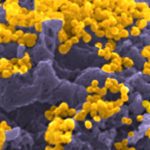Link to Pubmed [PMID] – 12604316
J. Autoimmun. 2003 Feb;20(1):91-5
Pemphigus is a group of autoimmune blistering diseases caused by autoantibodies directed against keratinocyte adhesion molecules. Pemphigus vulgaris (PV) and pemphigus foliaceus (PF), in which autoantibodies bind, respectively, to desmoglein 3 and desmoglein 1, are strongly associated with HLA-class II DR4 and DR14 alleles. In paraneoplastic pemphigus (PNP), a rare variant associated with neoplasia, autoantibodies target proteins of the plakin family in addition to desmogleins 1 and 3. The presence of anti-desmoglein antibodies in all types of pemphigus raises the question of common molecular mechanisms of susceptibility, particularly similar MHC-class II allele associations, in the different forms of the disease. HLA-DRB1 typing was performed in 13 PNP patients and results were compared to those obtained from 84 healthy controls, 37 PV and 31 PF patients. Our data demonstrate a significant association of PNP with HLA-DRB1*03 allele which was found in 61.5% of the patients, whereas DRB1*04 and DRB1*14 appear not to be involved in PNP susceptibility. Therefore, the HLA-genetic background of PNP differs from that of other types of pemphigus, which suggests that distinct mechanism(s) initiate(s) the immunological response in this form of pemphigus.

